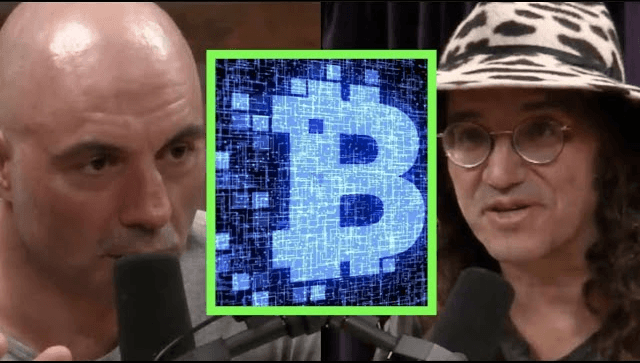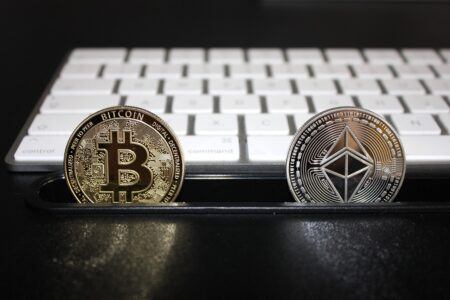Dr. Ben Goertzel, a renowned AI scientist and entrepreneur, discussed blockchain technology on the popular Joe Rogan podcast. Dr. Goertzel is an AI author and research professor at the Xiamen University of Technology, China. Alongside his academic endeavours, Dr. Goertzel is also involved in several business ventures in the fintech, robotics, and AI industries.
He is the founder and CEO of SingularityNET, a blockchain-based AI marketplace. The SingularityNET’s platform is being designed to allow anyone to create, share, and monetize AI services at scale. On December of last year, the project created its own token (AGI) and had an incredibly successful ICO, raising $36 million in just one minute and despite the falling markets AGI is up 20.84% against ETH in the last month:

This isn’t the first time that blockchain and cryptocurrencies were discussed on the Joe Rogan podcast, as Andreas Antonopoulos has been a regular guest on the show since 2014.
During the interview, Dr. Goertzel discussed several topics related to technology. He explained the technological singularity and discussed AI, blockchain technology, and simulated reality theory.
Joe Rogan: Open-source is self-explanatory in its title. But blockchain is confusing for a lot of people. Can you explain that?
Dr. Goertzel: Sure, I mean blockchain itself is almost a misnomer. So, things are confusing at every level. We should start with the idea of a distributed ledger, which is basically like a distributed excel spreadsheet or database. It’s just a store of information, which is not stored just in one place but there’s copies of it in a lot of different places. Everytime my copy of it is updated, everyone else’s copy of it has to be updated as well. That’s a distributed ledger and it’s part of distributed computing.
Now what makes it more interesting is when you layer decentralized control on top of that. So imagine you have this distributed database, there’s copies of it stored in a thousand places but to update it you need like 500 of those 1000 people who own the copies to vote “yeah, let’s do that update”. So then you have a distributed store of data, and you have a democratic voting mechanism to determine when all of those copies can get updated together. Then, what you have is a data storage and update mechanism that is controlled in a democratic way by the group participants, rather than by anyone’s central controller. And that can have all sort of advantages. For one thing it means that there is no one controller who can go rogue and screw up without telling anyone and it also means that no lunatic can go hold a gun to their head and shoot them for what data updates that remain.
It is controlled democratically by everybody. You can have people all over the world and updates to this whole distributed data store are made by democratic decision of all the participants. Then when cryptography comes in, when I vote I don’t have to say: “Yeah, this is Ben Goertzel voting for this update”. It is just “ID number 1357264”, and then encryption is used to make sure that it is the same guy voting everytime without needing your passport number.
Joe Rogan: What’s ironic about it is that it’s probably one of the best ways conceived to actually vote in this country?
Dr. Goertzel: There’s a lot of applications for it. That’s the core mechanism but where the blockchain comes from it is like a data structure. Data is stored in a chain of blocks, where each block contains data. The thing is not all the so-called blockchains even use a chain of blocks, some use a tree or graph of blocks.
Joe Rogan: Is it a bad term? Is it like “AI”, one of those terms we’re stuck with?
Dr. Goertzel: Yeah, it is one of those terms we’re stuck with even though it is not technically accurate anymore. I don’t know another buzzword for it. It is a distributed ledger with encryption and decentralized control. Blockchain is the buzzword that’s come about for it.
Now what got me interested in blockchain was the idea of decentralized control, this was very important for me even before bitcoin was invented. A global brain is evolving on the planet, involving humans, computers, and communication devices. And we don’t want this global brain to be controlled by a small elite, we want the global brain to be controlled in a decentralized way.
That’s really the beauty of the blockchain infrastructure. What got me interested in the practical technologies of blockchain was really when Ethereum came out.
Joe Rogan: What is Ethereum?
Dr. Goertzel: The first blockchain technology was bitcoin. Ethereum is another cryptocurrency, which is the number two cryptocurrency right now. However, Ethereum came along with a really nice software framework. It’s not just digital money like bitcoin is, ethereum has a programming language, called solidity, that came with it. And this programming language let’s you write what’s called smart contracts. And again that is a kind of misnomer, because a smart contract doesn’t need to be either smart or a contract.
Joe Rogan: What does it mean “smart contract”?
Dr. Goertzel: It is like a programmable transaction. You can program a legal contract or you can program a financial transaction. A smart contract it’s a persistent piece of software that embodies a secure encrypted transaction between multiple parties. Pretty much anything on a backend of a bank or website, or a transaction between two companies online, can all be scripted in smart contracts in a secure way. And then it would be automated in a simple and standard way.
The vision that Vitalik Buterin, the main creator behind ethereum, has is to basically make the internet into a giant computing mechanism, rather than mostly an information storage and retrieval mechanism. Make the internet into a giant computer but making a really simple programming language for scripting transactions among different computers and parties over the internet. You have encryption, democratic decision making, and distributed storage of information programmed into this world computer. That was a really cool idea and the ethereum blockchain and solidity programming language made it really easy to do that. I saw this and I taught: “wow, now we finally have the toolset needed to implement this”.
Joe Rogan: How popular is it [Ethereum]?
Dr. Goertzel: It’s very popular. Basically, almost every ICO that was done in the last couple of years was done on the ethereum blockchain. What happened in the last couple of years is that a bunch of people realized that you could use this ethereum programming framework to create a new cryptocurrency. Like new artificial money that you can then try to get people to use it.
Joe Rogan: Does the fluctuation value of cryptocurrencies worry you?
Dr. Goertzel: To my mind creating artificial money is a tiny bit of the potential of what you can do with the blockchain toolset. It happened to become popular initially because that is where the money is (laughter). It is money and that’s interesting to people. But on the other hand, what’s really about is creating a world computer. It’s about scripting, with a simple programming language, all sorts of transactions of information and value. It’s about decentralized voting mechanisms, it’s about AIs being able to send data and processing it for each other, it’s about automating supply chains, shipping and e-commerce.
In essence, just like computers and the internet started with a small number of applications and then prevailed almost anything, it’s the same way with blockchain technology. It started with digital money but the core technology is going to pervade almost everything. Because there is almost no domain of human pursuit that couldn’t use security through cryptography, some sort of participatory decision making, and then distributed storage of information.
And these things are also valuable for AI, which is how I got into it in the first place. If you’re making a very powerful AI, that is going to gradually grow up to become more intelligent, it should be able to engage with a large party of people and AIs in participatory decision making. The IA should be able to store information in a widely distributed way and it should certainly use security and encryption to validate the parties involved. These are the key things behind blockchain technology. The fact that blockchain began with artificial currencies, to me is a detail of history. Just like the fact that the internet began as a nuclear early warning system. It did, it’s good for that! But as it happens it is even better for a lot of other things.








